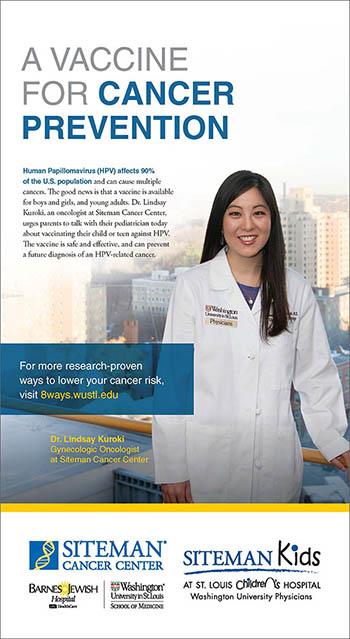 As one of PECaD’s goal is to increase community education to help reduce cancer disparities in our region and beyond, a new campaign in winter 2018 was launched to address cervical cancer prevention. This campaign highlights the risks of the Human Papillomavirus (HPV), and the benefits of the preventative HPV vaccine. Unfortunately, at least two strands of the HPV virus have been shown to cause cervical, vagina, and vulva cancers in women, penile cancer in men, and head and neck cancer in both men and women. However, the HPV vaccine available to children and young adults is safe and over 90 percent effective. Increasing HPV vaccination rates in Missouri, Illinois and nation-wide would help reduce the number HPV-related cancers by 90 percent.
As one of PECaD’s goal is to increase community education to help reduce cancer disparities in our region and beyond, a new campaign in winter 2018 was launched to address cervical cancer prevention. This campaign highlights the risks of the Human Papillomavirus (HPV), and the benefits of the preventative HPV vaccine. Unfortunately, at least two strands of the HPV virus have been shown to cause cervical, vagina, and vulva cancers in women, penile cancer in men, and head and neck cancer in both men and women. However, the HPV vaccine available to children and young adults is safe and over 90 percent effective. Increasing HPV vaccination rates in Missouri, Illinois and nation-wide would help reduce the number HPV-related cancers by 90 percent.
With help from Dr. Lindsay Kuroki, a gynecologic oncologist at Siteman Cancer Center and assistant professor of obstetrics and gynecology at Washington University School of Medicine, and the PECaD disparities elimination advisory board, PECaD was able to create a robust campaign for 2018. The first installment was an educational message that has been placed in local newspapers and appearing on social media about the HPV vaccine. This message features Dr. Kuroki urging parents to talk with their physician about the HPV vaccine, and understanding the risks and benefits of the vaccine. Additionally, Dr. Kuroki wrote two editorials – one in the St. Louis Post-Dispatch and the other in the St. Louis American – on the importance of vaccinating children and young adults against HPV. PECaD also hosted a special screening of the documentary, Someone You Love: The HPV Epidemic, with help from the Missouri Department of Health in late January for cervical cancer awareness month.
The Centers for Disease Control and Prevention (CDC) recommends that both girls and boys be vaccinated with a two-shot vaccine around ages 11 – 12. The second vaccine will be administered within one year after the first dose. Adolescents can be vaccinated until age 26, and being vaccinated after exposure to HPV will help reduce their risk of contracting future HPV infections. Adolescents and young adults, starting at age 15, who receive the HPV vaccine will require a three-dose vaccination series.